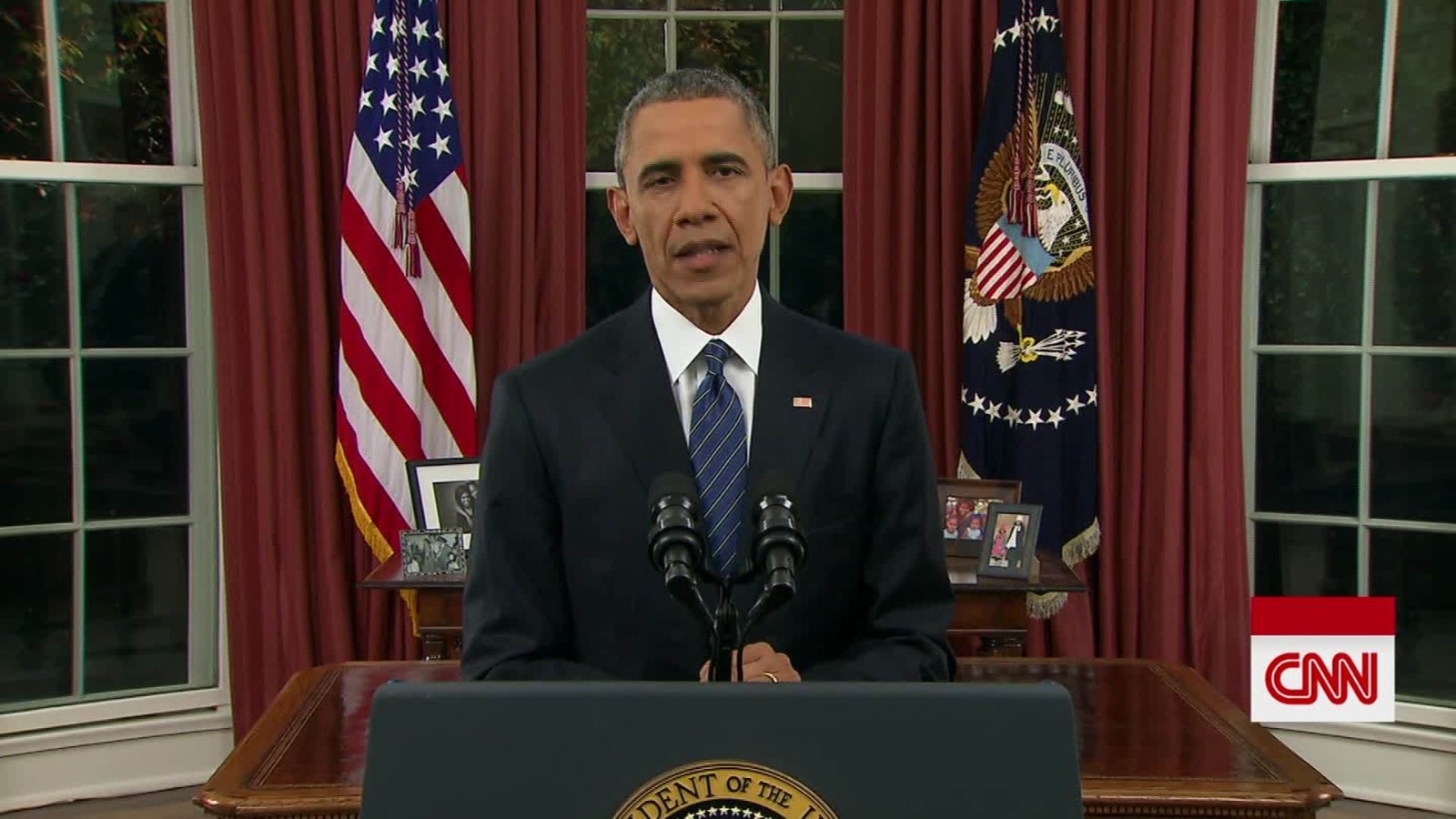What does ISIS really want?
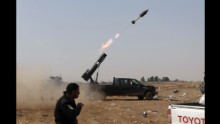
65 photos: The ISIS terror threat
Iraqi security forces launch a rocket against ISIS positions in Tikrit on Monday, March 30.
Hide Caption
33 of 65

65 photos: The ISIS terror threat
The parents of 19-year-old Mohammed Musallam react at the family's home in the East Jerusalem Jewish settlement of Neve Yaakov on Tuesday, March 10. ISIS released a video purportedly showing a young boy executing Musallam, an Israeli citizen of Palestinian descent who ISIS claimed infiltrated the group in Syria to spy for the Jewish state. Musallam's family told CNN that he had no ties with the Mossad, Israel's spy agency, and had, in fact, been recruited by ISIS.
Hide Caption
34 of 65
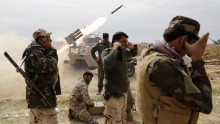
65 photos: The ISIS terror threat
Iraqi Shiite fighters cover their ears as a rocket is launched during a clash with ISIS militants in the town of Al-Alam, Iraq, on Monday, March 9.
Hide Caption
35 of 65

65 photos: The ISIS terror threat
Displaced Assyrian women who fled their homes due to ISIS attacks pray at a church on the outskirts of Damascus, Syria, on Sunday, March 1. ISIS militants abducted at least 220 Assyrians in Syria.
Hide Caption
36 of 65

65 photos: The ISIS terror threat
Safi al-Kasasbeh, right, receives condolences from tribal leaders at his home village near Karak, Jordan, on Wednesday, February 4. Al-Kasasbeh's son, Jordanian pilot Moath al-Kasasbeh, was burned alive in a video that was recently released by ISIS militants. Jordan is one of a handful of Middle Eastern nations taking part in the U.S.-led military coalition against ISIS.
Hide Caption
37 of 65
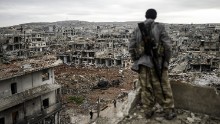
65 photos: The ISIS terror threat
A Kurdish marksman looks over a destroyed area of Kobani on Friday, January 30, after the city had been liberated from the ISIS militant group. The Syrian city, also known as Ayn al-Arab, had been under assault by ISIS since mid-September.
Hide Caption
38 of 65
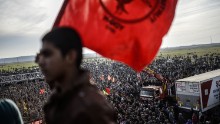
65 photos: The ISIS terror threat
Kurdish people celebrate in Suruc, Turkey, near the Turkish-Syrian border, after ISIS militants were expelled from Kobani on Tuesday, January 27.
Hide Caption
39 of 65
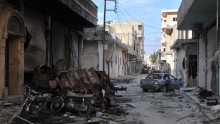
65 photos: The ISIS terror threat
Collapsed buildings are seen in Kobani on January 27 after Kurdish forces took control of the town from ISIS.
Hide Caption
40 of 65

65 photos: The ISIS terror threat
Junko Ishido, mother of Japanese journalist Kenji Goto, reacts during a news conference in Tokyo on Friday, January 23. ISIS would later kill Goto and another Japanese hostage, Haruna Yukawa.
Hide Caption
41 of 65

65 photos: The ISIS terror threat
ISIS militants are seen through a rifle's scope during clashes with Peshmerga fighters in Mosul, Iraq, on Wednesday, January 21.
Hide Caption
42 of 65
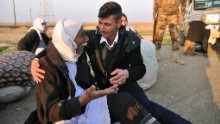
65 photos: The ISIS terror threat
An elderly Yazidi man arrives in Kirkuk after being released by ISIS on Saturday, January 17. The militant group released about 200 Yazidis who were held captive for five months in Iraq. Almost all of the freed prisoners were in poor health and bore signs of abuse and neglect, Kurdish officials said.
Hide Caption
43 of 65
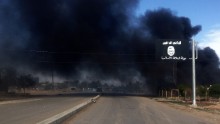
65 photos: The ISIS terror threat
Smoke billows behind an ISIS sign during an Iraqi military operation to regain control of the town of Sadiyah, about 95 kilometers (60 miles) north of Baghdad, on Tuesday, November 25.
Hide Caption
44 of 65
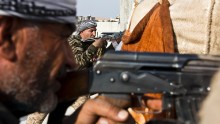
65 photos: The ISIS terror threat
Fighters from the Free Syrian Army and the Kurdish People's Protection Units join forces to fight ISIS in Kobani on Wednesday, November 19.
Hide Caption
45 of 65
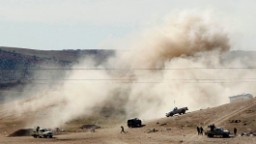
65 photos: The ISIS terror threat
A picture taken from Turkey shows smoke rising after ISIS militants fired mortar shells toward an area controlled by Syrian Kurdish fighters near Kobani on Monday, November 3.
Hide Caption
46 of 65
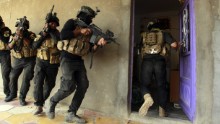
65 photos: The ISIS terror threat
Iraqi special forces search a house in Jurf al-Sakhar, Iraq, on Thursday, October 30, after retaking the area from ISIS.
Hide Caption
47 of 65

65 photos: The ISIS terror threat
ISIS militants stand near the site of an airstrike near the Turkey-Syria border on Thursday, October 23. The United States and several Arab nations have been bombing ISIS targets in Syria to take out the militant group's ability to command, train and resupply its fighters.
Hide Caption
48 of 65

65 photos: The ISIS terror threat
Kurdish fighters walk to positions as they combat ISIS forces in Kobani on Sunday, October 19.
Hide Caption
49 of 65
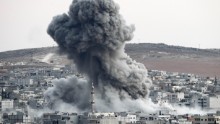
65 photos: The ISIS terror threat
Heavy smoke rises in Kobani following an airstrike by the U.S.-led coalition on October 18.
Hide Caption
50 of 65
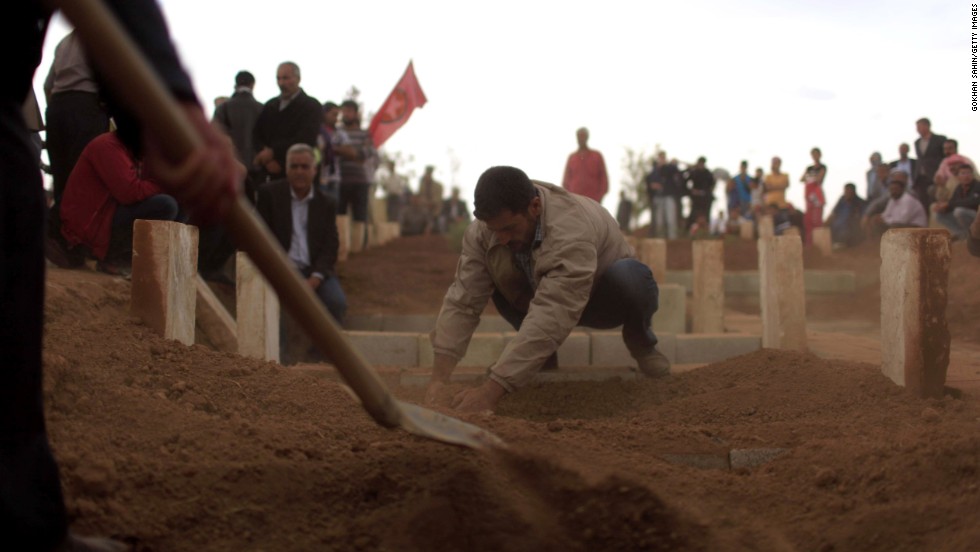
65 photos: The ISIS terror threat
Cundi Minaz, a female Kurdish fighter, is buried in a cemetery in the southeastern Turkish town of Suruc on Tuesday, October 14. Minaz was reportedly killed during clashes with ISIS militants in nearby Kobani.
Hide Caption
51 of 65
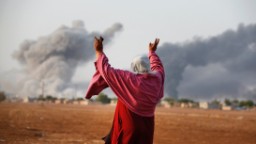
65 photos: The ISIS terror threat
Kiymet Ergun, a Syrian Kurd, celebrates in Mursitpinar, Turkey, after an airstrike by the U.S.-led coalition in Kobani on Monday, October 13.
Hide Caption
52 of 65
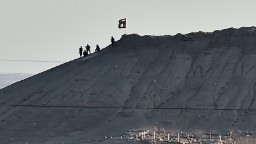
65 photos: The ISIS terror threat
Alleged ISIS militants stand next to an ISIS flag atop a hill in Kobani on Monday, October 6.
Hide Caption
53 of 65
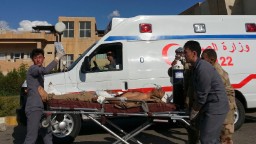
65 photos: The ISIS terror threat
A Kurdish Peshmerga soldier who was wounded in a battle with ISIS is wheeled to the Zakho Emergency Hospital in Duhuk, Iraq, on Tuesday, September 30.
Hide Caption
54 of 65
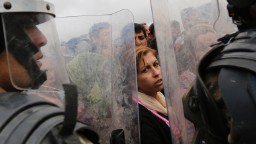
65 photos: The ISIS terror threat
Syrian Kurds wait near a border crossing in Suruc as they wait to return to their homes in Kobani on Sunday, September 28.
Hide Caption
55 of 65
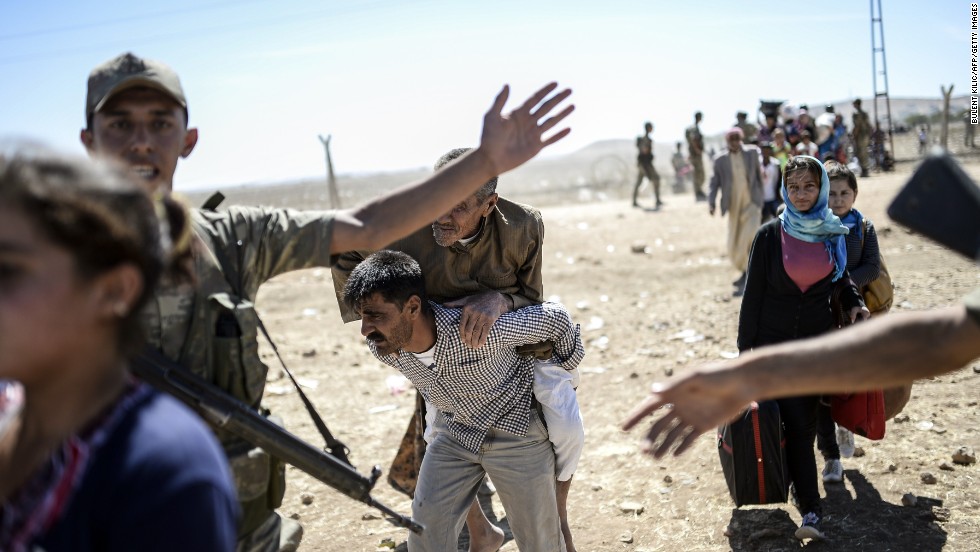
65 photos: The ISIS terror threat
A elderly man is carried after crossing the Syria-Turkey border near Suruc on Saturday, September 20.
Hide Caption
56 of 65
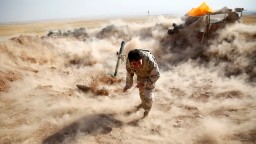
65 photos: The ISIS terror threat
A Kurdish Peshmerga fighter launches mortar shells toward ISIS militants in Zumar, Iraq, on Monday, September 15.
Hide Caption
57 of 65
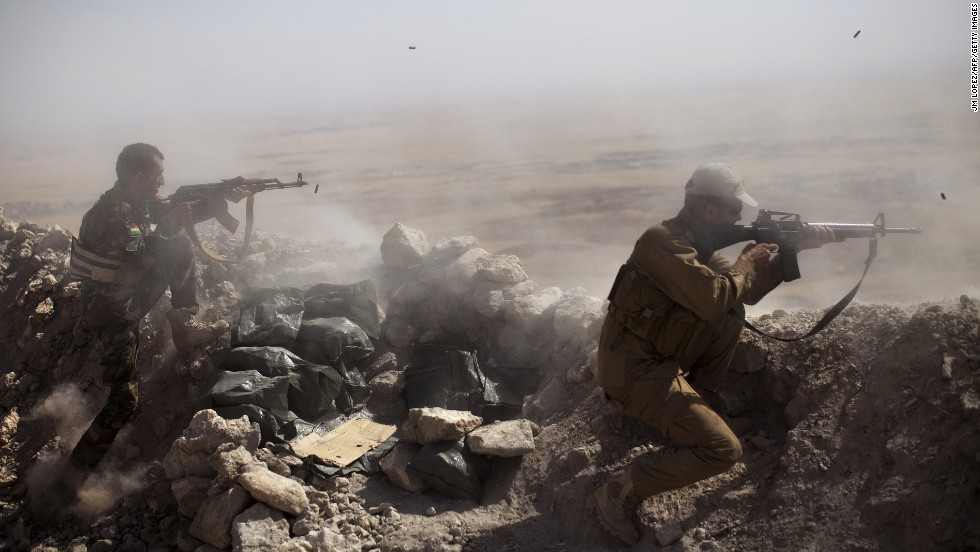
65 photos: The ISIS terror threat
Kurdish Peshmerga fighters fire at ISIS militant positions from their position on the top of Mount Zardak, east of Mosul, Iraq, on Tuesday, September 9.
Hide Caption
58 of 65
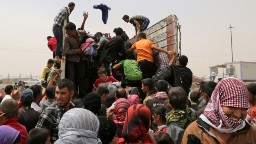
65 photos: The ISIS terror threat
Displaced Iraqis receive clothes from a charity at a refugee camp near Feeshkhabour, Iraq, on Tuesday, August 19.
Hide Caption
59 of 65
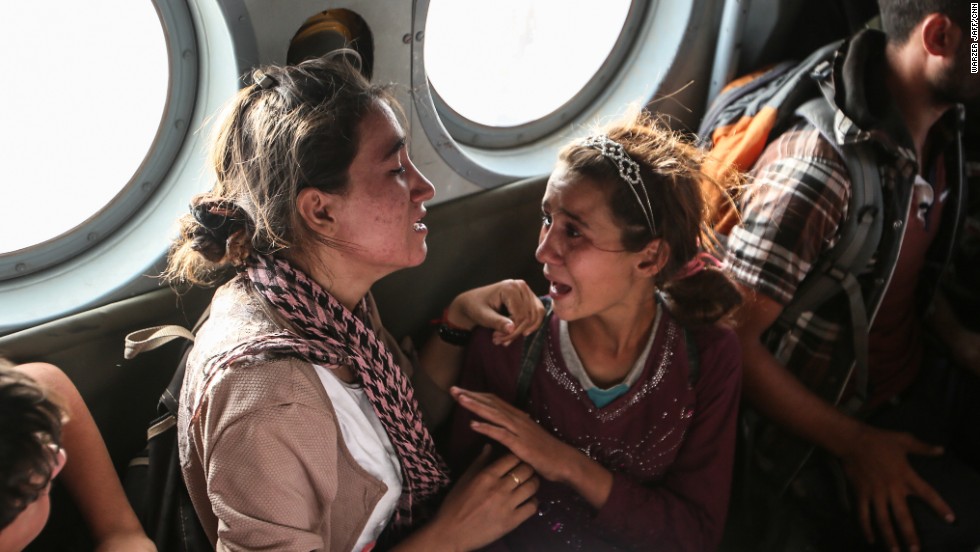
65 photos: The ISIS terror threat
Aziza Hamid, a 15-year-old Iraqi girl, cries for her father while she and some other Yazidi people are flown to safety Monday, August 11, after a dramatic rescue operation at Iraq's Mount Sinjar. A CNN crew was on the flight, which took diapers, milk, water and food to the site where as many as 70,000 people were trapped by ISIS. But only a few of them were able to fly back on the helicopter with the Iraqi Air Force and Kurdish Peshmerga fighters.
Hide Caption
60 of 65
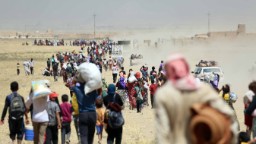
65 photos: The ISIS terror threat
Thousands of Yazidis are escorted to safety by Kurdish Peshmerga forces and a People's Protection Unit in Mosul on Saturday, August 9.
Hide Caption
61 of 65
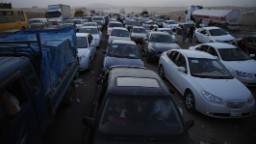
65 photos: The ISIS terror threat
Thousands of Yazidi and Christian people flee Mosul on Wednesday, August 6, after the latest wave of ISIS advances.
Hide Caption
62 of 65
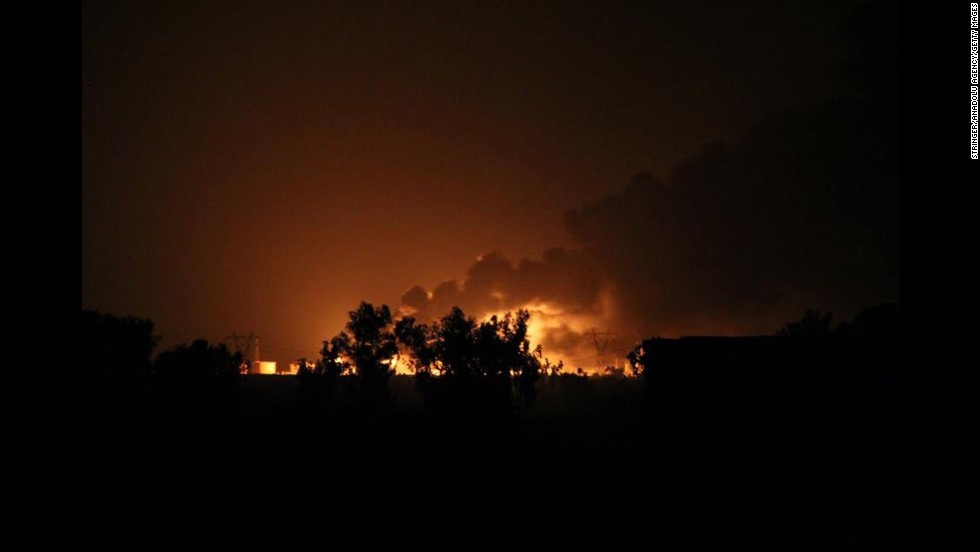
65 photos: The ISIS terror threat
A Baiji oil refinery burns after an alleged ISIS attack in northern Selahaddin, Iraq, on Thursday, July 31.
Hide Caption
63 of 65

65 photos: The ISIS terror threat
A Syrian rebel fighter lies on a stretcher at a makeshift hospital in Douma, Syria, on Wednesday, July 9. He was reportedly injured while fighting ISIS militants.
Hide Caption
64 of 65
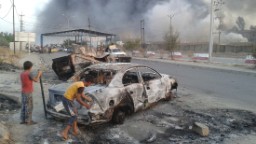
65 photos: The ISIS terror threat
Children stand next to a burnt vehicle during clashes between Iraqi security forces and ISIS militants in Mosul on Tuesday, June 10.
Hide Caption
65 of 65
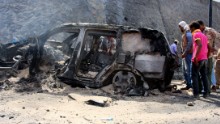
65 photos: The ISIS terror threat
Yemenis check the scene of a car bomb attack Sunday, December 6, in Aden, Yemen. Aden Gov. Jaafar Saad and six bodyguards died in the attack, for which the terror group ISIS claimed responsibility.
Hide Caption
1 of 65
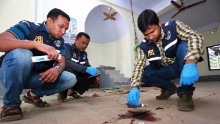
65 photos: The ISIS terror threat
Investigators check the scene of a mosque attack Friday, November 27, in northern Bangladesh's Bogra district.ISIS has claimed responsibility for the attack that left at least one person dead and three more wounded.
Hide Caption
2 of 65

65 photos: The ISIS terror threat
Wounded people are helped outside the Bataclan concert hall in Paris following a series of coordinated attacks in the city on Friday, November 13. The militant group ISIS claimed responsibility for the attacks, which killed at least 130 people and wounded hundreds more.
Hide Caption
3 of 65
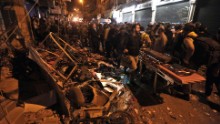
65 photos: The ISIS terror threat
Emergency personnel and civilians gather at the site of a twin suicide bombing in Beirut, Lebanon, on Thursday, November 12. The bombings killed at least 43 people and wounded more than 200 more. ISIS appeared to claim responsibility in a statement posted on social media.
Hide Caption
4 of 65
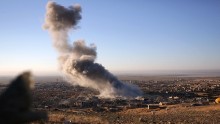
65 photos: The ISIS terror threat
Smoke rises over the northern Iraqi town of Sinjar on November 12. Kurdish Iraqi fighters, backed by a U.S.-led air campaign, retook the strategic town, which ISIS militants overran last year. ISIS wants to create an Islamic state across Sunni areas of Iraq and Syria.
Hide Caption
5 of 65
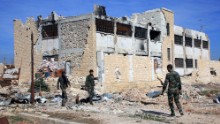
65 photos: The ISIS terror threat
Syrian government troops walk inside the Kweiras air base on Wednesday, November 11, after they broke a siege imposed by ISIS militants.
Hide Caption
6 of 65
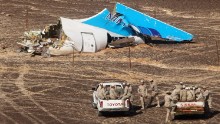
65 photos: The ISIS terror threat
Members of the Egyptian military approach the wreckage of a Russian passenger plane Sunday, November 1, in Hassana, Egypt. The plane crashed the day before, killing all 224 people on board. ISIS claimed responsibility for downing the plane, but the group's claim wasn't immediately verified.
Hide Caption
7 of 65
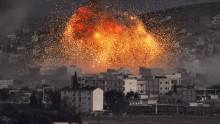
65 photos: The ISIS terror threat
An explosion rocks Kobani, Syria, during a reported car bomb attack by ISIS militants on Tuesday, October 20.
Hide Caption
8 of 65
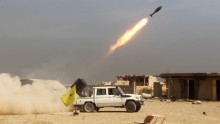
65 photos: The ISIS terror threat
Shiite fighters, fighting alongside Iraqi government forces, fire a rocket at ISIS militants as they advance toward the center of Baiji, Iraq, on Monday, October 19.
Hide Caption
9 of 65
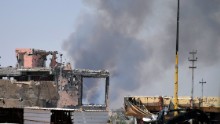
65 photos: The ISIS terror threat
Smoke rises above a damaged building in Ramadi, Iraq, following a coalition airstrike against ISIS positions on Saturday, August 15.
Hide Caption
10 of 65
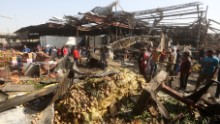
65 photos: The ISIS terror threat
Iraqi men look at damage following a bomb explosion that targeted a vegetable market in Baghdad on Thursday, August 13. ISIS claimed responsibility for the attack.
Hide Caption
11 of 65
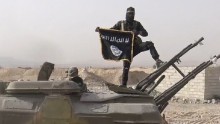
65 photos: The ISIS terror threat
In this image taken from social media, an ISIS fighter holds the group's flag after the militant group overran the Syrian town of al-Qaryatayn on Thursday, August 6, the London-based Syrian Observatory for Human Rights reported.
Hide Caption
12 of 65
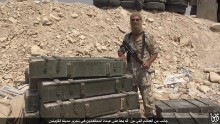
65 photos: The ISIS terror threat
An ISIS fighter poses with spoils purportedly taken after capturing the Syrian town of al-Qaryatayn.
Hide Caption
13 of 65
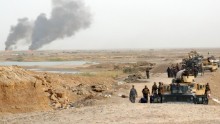
65 photos: The ISIS terror threat
Smoke rises as Iraqi security forces bomb ISIS positions in the eastern suburbs of Ramadi, Iraq, on August 6.
Hide Caption
14 of 65
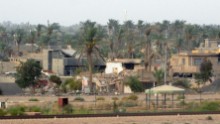
65 photos: The ISIS terror threat
Buildings reduced to piles of debris can be seen in the eastern suburbs of Ramadi on August 6.
Hide Caption
15 of 65

65 photos: The ISIS terror threat
The governor of the Asir region in Saudi Arabia, Prince Faisal bin Khaled bin Abdulaziz, left, visits a man who was wounded in a suicide bombing attack on a mosque in Abha, Saudi Arabia, on August 6. ISIS claimed responsibility for the explosion, which killed at least 13 people and injured nine others.
Hide Caption
16 of 65
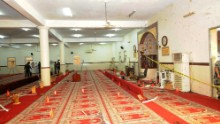
65 photos: The ISIS terror threat
Saudi officials and investigators check the inside of the mosque on August 6.
Hide Caption
17 of 65

65 photos: The ISIS terror threat
Mourners in Gaziantep, Turkey, grieve over a coffin Tuesday, July 21, during a funeral ceremony for the victims of a suspected ISIS suicide bomb attack. That bombing killed at least 31 people in Suruc, a Turkish town that borders Syria. Turkish authorities blamed ISIS for the attack.
Hide Caption
18 of 65

65 photos: The ISIS terror threat
Protesters in Istanbul carry anti-ISIS banners and flags to show support for victims of the Suruc suicide blast during a demonstration on Monday, July 20.
Hide Caption
19 of 65
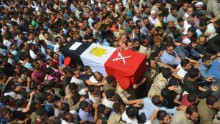
65 photos: The ISIS terror threat
People in Ashmoun, Egypt, carry the coffin for 1st Lt. Mohammed Ashraf, who was killed when the ISIS militant group attacked Egyptian military checkpoints on Wednesday, July 1. At least 17 soldiers were reportedly killed, and 30 were injured.
Hide Caption
20 of 65
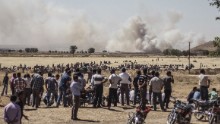
65 photos: The ISIS terror threat
Syrians wait near the Turkish border during clashes between ISIS and Kurdish armed groups in Kobani, Syria, on Thursday, June 25. The photo was taken in Sanliurfa, Turkey. ISIS militants disguised as Kurdish security forces infiltrated Kobani on Thursday and killed "many civilians," said a spokesman for the Kurds in Kobani.
Hide Caption
21 of 65
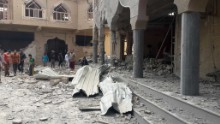
65 photos: The ISIS terror threat
Residents examine a damaged mosque after an Iraqi Air Force bombing in the ISIS-seized city of Falluja, Iraq, on Sunday, May 31. At least six were killed and nine others wounded during the bombing.
Hide Caption
22 of 65

65 photos: The ISIS terror threat
People search through debris after an explosion at a Shiite mosque in Qatif, Saudi Arabia, on Friday, May 22. ISISclaimed responsibility for the attack, according to tweets from ISIS supporters, which included a formal statement from ISIS detailing the operation.
Hide Caption
23 of 65
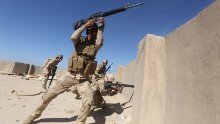
65 photos: The ISIS terror threat
Iraqi soldiers fire their weapons toward ISIS group positions in the Garma district, west of the Iraqi capital of Baghdad, on Sunday, April 26. Pro-government forces said they had recently made advances on areas held by Islamist jihadists.
Hide Caption
24 of 65
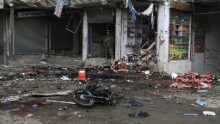
65 photos: The ISIS terror threat
A member of Afghanistan's security forces stands at the site where a suicide bomber on a motorbike blew himself up in front of the Kabul Bank in Jalalabad, Afghanistan, on Saturday, April 18. ISIS claimed responsibility for the attack. The explosion killed at least 33 people and injured more than 100 others, a public health spokesman said.
Hide Caption
25 of 65
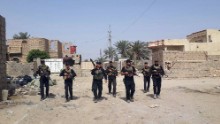
65 photos: The ISIS terror threat
Iraqi counterterrorism forces patrol in Ramadi on April 18.
Hide Caption
26 of 65
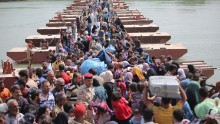
65 photos: The ISIS terror threat
Thousands of Iraqis cross a bridge over the Euphrates River to Baghdad as they flee Ramadi on Friday, April 17.
Hide Caption
27 of 65
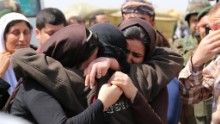
65 photos: The ISIS terror threat
Yazidis embrace after being released by ISIS south of Kirkuk, Iraq, on Wednesday, April 8. ISIS released more than 200 Yazidis, a minority group whose members were killed, captured and displaced when the Islamist terror organization overtook their towns in northern Iraq last summer, officials said.
Hide Caption
28 of 65
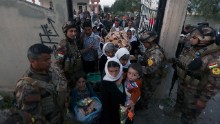
65 photos: The ISIS terror threat
Kurdish Peshmerga forces help Yazidis as they arrive at a medical center in Altun Kupri, Iraq, on April 8.
Hide Caption
29 of 65
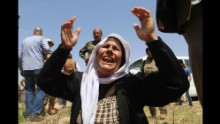
65 photos: The ISIS terror threat
A Yazidi woman mourns for the death of her husband and children by ISIS after being released south of Kirkuk on April 8.
Hide Caption
30 of 65
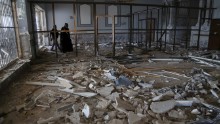
65 photos: The ISIS terror threat
People in Tikrit inspect what used to be a palace of former President Saddam Hussein on April 3.
Hide Caption
31 of 65
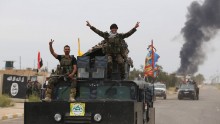
65 photos: The ISIS terror threat
On April 1, Shiite militiamen celebrate the retaking of Tikrit, which had been under ISIS control since June. The push into Tikrit came days after U.S.-led airstrikes targeted ISIS bases around the city.
Hide Caption
32 of 65

65 photos: The ISIS terror threat
Iraqi security forces launch a rocket against ISIS positions in Tikrit on Monday, March 30.
Hide Caption
33 of 65

65 photos: The ISIS terror threat
The parents of 19-year-old Mohammed Musallam react at the family's home in the East Jerusalem Jewish settlement of Neve Yaakov on Tuesday, March 10. ISIS released a video purportedly showing a young boy executing Musallam, an Israeli citizen of Palestinian descent who ISIS claimed infiltrated the group in Syria to spy for the Jewish state. Musallam's family told CNN that he had no ties with the Mossad, Israel's spy agency, and had, in fact, been recruited by ISIS.
Hide Caption
34 of 65

65 photos: The ISIS terror threat
Iraqi Shiite fighters cover their ears as a rocket is launched during a clash with ISIS militants in the town of Al-Alam, Iraq, on Monday, March 9.
Hide Caption
35 of 65

65 photos: The ISIS terror threat
Displaced Assyrian women who fled their homes due to ISIS attacks pray at a church on the outskirts of Damascus, Syria, on Sunday, March 1. ISIS militants abducted at least 220 Assyrians in Syria.
Hide Caption
36 of 65

65 photos: The ISIS terror threat
Safi al-Kasasbeh, right, receives condolences from tribal leaders at his home village near Karak, Jordan, on Wednesday, February 4. Al-Kasasbeh's son, Jordanian pilot Moath al-Kasasbeh, was burned alive in a video that was recently released by ISIS militants. Jordan is one of a handful of Middle Eastern nations taking part in the U.S.-led military coalition against ISIS.
Hide Caption
37 of 65

65 photos: The ISIS terror threat
A Kurdish marksman looks over a destroyed area of Kobani on Friday, January 30, after the city had been liberated from the ISIS militant group. The Syrian city, also known as Ayn al-Arab, had been under assault by ISIS since mid-September.
Hide Caption
38 of 65

65 photos: The ISIS terror threat
Kurdish people celebrate in Suruc, Turkey, near the Turkish-Syrian border, after ISIS militants were expelled from Kobani on Tuesday, January 27.
Hide Caption
39 of 65

65 photos: The ISIS terror threat
Collapsed buildings are seen in Kobani on January 27 after Kurdish forces took control of the town from ISIS.
Hide Caption
40 of 65

65 photos: The ISIS terror threat
Junko Ishido, mother of Japanese journalist Kenji Goto, reacts during a news conference in Tokyo on Friday, January 23. ISIS would later kill Goto and another Japanese hostage, Haruna Yukawa.
Hide Caption
41 of 65

65 photos: The ISIS terror threat
ISIS militants are seen through a rifle's scope during clashes with Peshmerga fighters in Mosul, Iraq, on Wednesday, January 21.
Hide Caption
42 of 65

65 photos: The ISIS terror threat
An elderly Yazidi man arrives in Kirkuk after being released by ISIS on Saturday, January 17. The militant group released about 200 Yazidis who were held captive for five months in Iraq. Almost all of the freed prisoners were in poor health and bore signs of abuse and neglect, Kurdish officials said.
Hide Caption
43 of 65

65 photos: The ISIS terror threat
Smoke billows behind an ISIS sign during an Iraqi military operation to regain control of the town of Sadiyah, about 95 kilometers (60 miles) north of Baghdad, on Tuesday, November 25.
Hide Caption
44 of 65

65 photos: The ISIS terror threat
Fighters from the Free Syrian Army and the Kurdish People's Protection Units join forces to fight ISIS in Kobani on Wednesday, November 19.
Hide Caption
45 of 65

65 photos: The ISIS terror threat
A picture taken from Turkey shows smoke rising after ISIS militants fired mortar shells toward an area controlled by Syrian Kurdish fighters near Kobani on Monday, November 3.
Hide Caption
46 of 65

65 photos: The ISIS terror threat
Iraqi special forces search a house in Jurf al-Sakhar, Iraq, on Thursday, October 30, after retaking the area from ISIS.
Hide Caption
47 of 65

65 photos: The ISIS terror threat
ISIS militants stand near the site of an airstrike near the Turkey-Syria border on Thursday, October 23. The United States and several Arab nations have been bombing ISIS targets in Syria to take out the militant group's ability to command, train and resupply its fighters.
Hide Caption
48 of 65

65 photos: The ISIS terror threat
Kurdish fighters walk to positions as they combat ISIS forces in Kobani on Sunday, October 19.
Hide Caption
49 of 65

65 photos: The ISIS terror threat
Heavy smoke rises in Kobani following an airstrike by the U.S.-led coalition on October 18.
Hide Caption
50 of 65

65 photos: The ISIS terror threat
Cundi Minaz, a female Kurdish fighter, is buried in a cemetery in the southeastern Turkish town of Suruc on Tuesday, October 14. Minaz was reportedly killed during clashes with ISIS militants in nearby Kobani.
Hide Caption
51 of 65

65 photos: The ISIS terror threat
Kiymet Ergun, a Syrian Kurd, celebrates in Mursitpinar, Turkey, after an airstrike by the U.S.-led coalition in Kobani on Monday, October 13.
Hide Caption
52 of 65

65 photos: The ISIS terror threat
Alleged ISIS militants stand next to an ISIS flag atop a hill in Kobani on Monday, October 6.
Hide Caption
53 of 65

65 photos: The ISIS terror threat
A Kurdish Peshmerga soldier who was wounded in a battle with ISIS is wheeled to the Zakho Emergency Hospital in Duhuk, Iraq, on Tuesday, September 30.
Hide Caption
54 of 65

65 photos: The ISIS terror threat
Syrian Kurds wait near a border crossing in Suruc as they wait to return to their homes in Kobani on Sunday, September 28.
Hide Caption
55 of 65

65 photos: The ISIS terror threat
A elderly man is carried after crossing the Syria-Turkey border near Suruc on Saturday, September 20.
Hide Caption
56 of 65

65 photos: The ISIS terror threat
A Kurdish Peshmerga fighter launches mortar shells toward ISIS militants in Zumar, Iraq, on Monday, September 15.
Hide Caption
57 of 65

65 photos: The ISIS terror threat
Kurdish Peshmerga fighters fire at ISIS militant positions from their position on the top of Mount Zardak, east of Mosul, Iraq, on Tuesday, September 9.
Hide Caption
58 of 65

65 photos: The ISIS terror threat
Displaced Iraqis receive clothes from a charity at a refugee camp near Feeshkhabour, Iraq, on Tuesday, August 19.
Hide Caption
59 of 65

65 photos: The ISIS terror threat
Aziza Hamid, a 15-year-old Iraqi girl, cries for her father while she and some other Yazidi people are flown to safety Monday, August 11, after a dramatic rescue operation at Iraq's Mount Sinjar. A CNN crew was on the flight, which took diapers, milk, water and food to the site where as many as 70,000 people were trapped by ISIS. But only a few of them were able to fly back on the helicopter with the Iraqi Air Force and Kurdish Peshmerga fighters.
Hide Caption
60 of 65

65 photos: The ISIS terror threat
Thousands of Yazidis are escorted to safety by Kurdish Peshmerga forces and a People's Protection Unit in Mosul on Saturday, August 9.
Hide Caption
61 of 65

65 photos: The ISIS terror threat
Thousands of Yazidi and Christian people flee Mosul on Wednesday, August 6, after the latest wave of ISIS advances.
Hide Caption
62 of 65

65 photos: The ISIS terror threat
A Baiji oil refinery burns after an alleged ISIS attack in northern Selahaddin, Iraq, on Thursday, July 31.
Hide Caption
63 of 65

65 photos: The ISIS terror threat
A Syrian rebel fighter lies on a stretcher at a makeshift hospital in Douma, Syria, on Wednesday, July 9. He was reportedly injured while fighting ISIS militants.
Hide Caption
64 of 65

65 photos: The ISIS terror threat
Children stand next to a burnt vehicle during clashes between Iraqi security forces and ISIS militants in Mosul on Tuesday, June 10.
Hide Caption
65 of 65

65 photos: The ISIS terror threat
Yemenis check the scene of a car bomb attack Sunday, December 6, in Aden, Yemen. Aden Gov. Jaafar Saad and six bodyguards died in the attack, for which the terror group ISIS claimed responsibility.
Hide Caption
1 of 65

65 photos: The ISIS terror threat
Investigators check the scene of a mosque attack Friday, November 27, in northern Bangladesh's Bogra district.ISIS has claimed responsibility for the attack that left at least one person dead and three more wounded.
Hide Caption
2 of 65

65 photos: The ISIS terror threat
Wounded people are helped outside the Bataclan concert hall in Paris following a series of coordinated attacks in the city on Friday, November 13. The militant group ISIS claimed responsibility for the attacks, which killed at least 130 people and wounded hundreds more.
Hide Caption
3 of 65

65 photos: The ISIS terror threat
Emergency personnel and civilians gather at the site of a twin suicide bombing in Beirut, Lebanon, on Thursday, November 12. The bombings killed at least 43 people and wounded more than 200 more. ISIS appeared to claim responsibility in a statement posted on social media.
Hide Caption
4 of 65

65 photos: The ISIS terror threat
Smoke rises over the northern Iraqi town of Sinjar on November 12. Kurdish Iraqi fighters, backed by a U.S.-led air campaign, retook the strategic town, which ISIS militants overran last year. ISIS wants to create an Islamic state across Sunni areas of Iraq and Syria.
Hide Caption
5 of 65

65 photos: The ISIS terror threat
Syrian government troops walk inside the Kweiras air base on Wednesday, November 11, after they broke a siege imposed by ISIS militants.
Hide Caption
6 of 65

65 photos: The ISIS terror threat
Members of the Egyptian military approach the wreckage of a Russian passenger plane Sunday, November 1, in Hassana, Egypt. The plane crashed the day before, killing all 224 people on board. ISIS claimed responsibility for downing the plane, but the group's claim wasn't immediately verified.
Hide Caption
7 of 65

65 photos: The ISIS terror threat
An explosion rocks Kobani, Syria, during a reported car bomb attack by ISIS militants on Tuesday, October 20.
Hide Caption
8 of 65

65 photos: The ISIS terror threat
Shiite fighters, fighting alongside Iraqi government forces, fire a rocket at ISIS militants as they advance toward the center of Baiji, Iraq, on Monday, October 19.
Hide Caption
9 of 65

65 photos: The ISIS terror threat
Smoke rises above a damaged building in Ramadi, Iraq, following a coalition airstrike against ISIS positions on Saturday, August 15.
Hide Caption
10 of 65

65 photos: The ISIS terror threat
Iraqi men look at damage following a bomb explosion that targeted a vegetable market in Baghdad on Thursday, August 13. ISIS claimed responsibility for the attack.
Hide Caption
11 of 65

65 photos: The ISIS terror threat
In this image taken from social media, an ISIS fighter holds the group's flag after the militant group overran the Syrian town of al-Qaryatayn on Thursday, August 6, the London-based Syrian Observatory for Human Rights reported.
Hide Caption
12 of 65

65 photos: The ISIS terror threat
An ISIS fighter poses with spoils purportedly taken after capturing the Syrian town of al-Qaryatayn.
Hide Caption
13 of 65

65 photos: The ISIS terror threat
Smoke rises as Iraqi security forces bomb ISIS positions in the eastern suburbs of Ramadi, Iraq, on August 6.
Hide Caption
14 of 65

65 photos: The ISIS terror threat
Buildings reduced to piles of debris can be seen in the eastern suburbs of Ramadi on August 6.
Hide Caption
15 of 65

65 photos: The ISIS terror threat
The governor of the Asir region in Saudi Arabia, Prince Faisal bin Khaled bin Abdulaziz, left, visits a man who was wounded in a suicide bombing attack on a mosque in Abha, Saudi Arabia, on August 6. ISIS claimed responsibility for the explosion, which killed at least 13 people and injured nine others.
Hide Caption
16 of 65

65 photos: The ISIS terror threat
Saudi officials and investigators check the inside of the mosque on August 6.
Hide Caption
17 of 65

65 photos: The ISIS terror threat
Mourners in Gaziantep, Turkey, grieve over a coffin Tuesday, July 21, during a funeral ceremony for the victims of a suspected ISIS suicide bomb attack. That bombing killed at least 31 people in Suruc, a Turkish town that borders Syria. Turkish authorities blamed ISIS for the attack.
Hide Caption
18 of 65

65 photos: The ISIS terror threat
Protesters in Istanbul carry anti-ISIS banners and flags to show support for victims of the Suruc suicide blast during a demonstration on Monday, July 20.
Hide Caption
19 of 65

65 photos: The ISIS terror threat
People in Ashmoun, Egypt, carry the coffin for 1st Lt. Mohammed Ashraf, who was killed when the ISIS militant group attacked Egyptian military checkpoints on Wednesday, July 1. At least 17 soldiers were reportedly killed, and 30 were injured.
Hide Caption
20 of 65

65 photos: The ISIS terror threat
Syrians wait near the Turkish border during clashes between ISIS and Kurdish armed groups in Kobani, Syria, on Thursday, June 25. The photo was taken in Sanliurfa, Turkey. ISIS militants disguised as Kurdish security forces infiltrated Kobani on Thursday and killed "many civilians," said a spokesman for the Kurds in Kobani.
Hide Caption
21 of 65

65 photos: The ISIS terror threat
Residents examine a damaged mosque after an Iraqi Air Force bombing in the ISIS-seized city of Falluja, Iraq, on Sunday, May 31. At least six were killed and nine others wounded during the bombing.
Hide Caption
22 of 65

65 photos: The ISIS terror threat
People search through debris after an explosion at a Shiite mosque in Qatif, Saudi Arabia, on Friday, May 22. ISISclaimed responsibility for the attack, according to tweets from ISIS supporters, which included a formal statement from ISIS detailing the operation.
Hide Caption
23 of 65

65 photos: The ISIS terror threat
Iraqi soldiers fire their weapons toward ISIS group positions in the Garma district, west of the Iraqi capital of Baghdad, on Sunday, April 26. Pro-government forces said they had recently made advances on areas held by Islamist jihadists.
Hide Caption
24 of 65

65 photos: The ISIS terror threat
A member of Afghanistan's security forces stands at the site where a suicide bomber on a motorbike blew himself up in front of the Kabul Bank in Jalalabad, Afghanistan, on Saturday, April 18. ISIS claimed responsibility for the attack. The explosion killed at least 33 people and injured more than 100 others, a public health spokesman said.
Hide Caption
25 of 65

65 photos: The ISIS terror threat
Iraqi counterterrorism forces patrol in Ramadi on April 18.
Hide Caption
26 of 65

65 photos: The ISIS terror threat
Thousands of Iraqis cross a bridge over the Euphrates River to Baghdad as they flee Ramadi on Friday, April 17.
Hide Caption
27 of 65

65 photos: The ISIS terror threat
Yazidis embrace after being released by ISIS south of Kirkuk, Iraq, on Wednesday, April 8. ISIS released more than 200 Yazidis, a minority group whose members were killed, captured and displaced when the Islamist terror organization overtook their towns in northern Iraq last summer, officials said.
Hide Caption
28 of 65

65 photos: The ISIS terror threat
Kurdish Peshmerga forces help Yazidis as they arrive at a medical center in Altun Kupri, Iraq, on April 8.
Hide Caption
29 of 65

65 photos: The ISIS terror threat
A Yazidi woman mourns for the death of her husband and children by ISIS after being released south of Kirkuk on April 8.
Hide Caption
30 of 65

65 photos: The ISIS terror threat
People in Tikrit inspect what used to be a palace of former President Saddam Hussein on April 3.
Hide Caption
31 of 65

65 photos: The ISIS terror threat
On April 1, Shiite militiamen celebrate the retaking of Tikrit, which had been under ISIS control since June. The push into Tikrit came days after U.S.-led airstrikes targeted ISIS bases around the city.
Hide Caption
32 of 65

65 photos: The ISIS terror threat
Iraqi security forces launch a rocket against ISIS positions in Tikrit on Monday, March 30.
Hide Caption
33 of 65
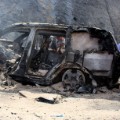


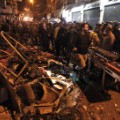
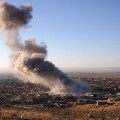
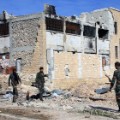
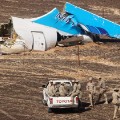

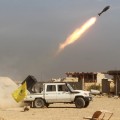
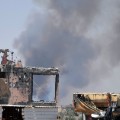
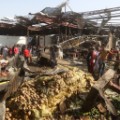
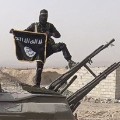
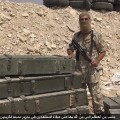
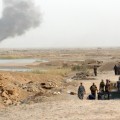
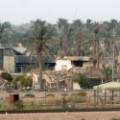





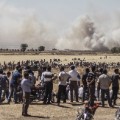
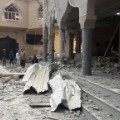

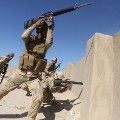
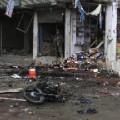
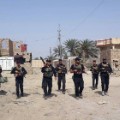

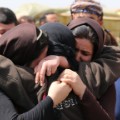
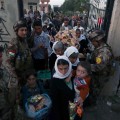
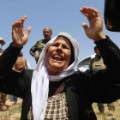
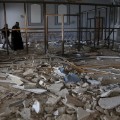
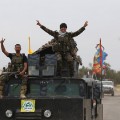
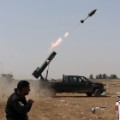

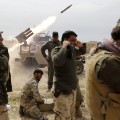


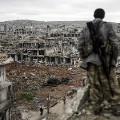
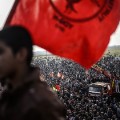
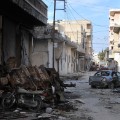


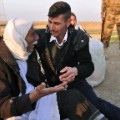
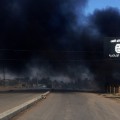
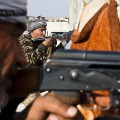

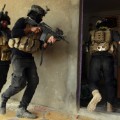


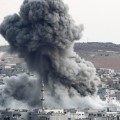





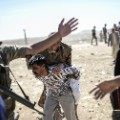









Story highlights
- ISIS' rise in Iraq was so sudden that many were caught off guard
- The group's ultimate ambition is a global caliphate won through a worldwide war
- There can only be one victor in this struggle, according to ISIS' millenarian views
(CNN)How to stop ISIS -- it's the question the leaders of the free world are struggling to answer.
The debate is frequently about tactics: How to gain a battlefield advantage, how to stop its propaganda machine, how to block its sources of revenue.
But less frequently is there discussion of the group's aims -- what it ultimately wants to achieve and the steps for reaching that goal.
The group's rise in Iraq -- and its capture of thousands of square miles of land -- was so sudden and shocking that it left many analysts and officials flatfooted. A year ago, the New York Times publishedconfidential comments about ISIS' ideology by Major General Michael K. Nagata, then U.S. Special Operations commander in the Middle East.
"We have not defeated the idea," he is reported to have said. "We do not even understand the idea."
ISIS makes no secret of its ultimate ambition: A global caliphate secured through a global war. To that end it speaks of "remaining and expanding" its existing hold over much of Iraq and Syria. It aims to replace existing, man-made borders, to overcome what it sees as the Shiite "crescent" that has emerged across the Middle East, to take its war -- Islam's war -- to Europe and America, and ultimately to lead Muslims toward an apocalyptic battle against the "disbelievers."
Its propaganda relies on a very distinct interpretation of the Quran and other religious texts to promote these goals -- and most importantly to show its supporters that they are achievable.
A global caliphate
ISIS frequently uses its online magazine Dabiq to set out its vision. The title of the magazine is no accident -- Dabiq is a town in northern Syria currently held by ISIS where, according to Islamic prophecy, the armies of Rome will mass to meet the armies of Islam.
Prophecy is critical to ISIS, which accepts the word of the Prophet and the hadith, or sayings, attributed to him literally and without question. Prophecy provides ISIS with the glue of theological certainty. And according to those prophecies, the Islamic armies will ultimately conquer Jerusalem and Rome.
ISIS ideologues constantly cite the Quran in shaping the group's vision. Hundreds of the group's statements, audio and video messages, carry copious references to the words of the Prophet. No matter that the majority of Muslims -- even many jihadists - see ISIS' interpretations of the Quran and the hadith as manipulations or distortions.
The revival of the caliphate is the launching pad for a global battlefield. No caliph can govern without pursuing offensive jihad, and that jihad will continue, as Dabiq put it, until "the shade of the blessed flag will expand until it covers all eastern and western extents of the Earth."
That jihad has already begun -- and in the process ISIS supporters point to the prophecy that declares: "There will come a time when three armies of Islam shall simultaneously rise, one in the Levant, one in Yemen and one in Iraq."
It is powerful motivation to ISIS supporters, and it's also a message to Muslims: The end of times is at hand, and if you want to be a true Muslim, on the right side of history, you had better join us.
Above all, ISIS seeks the fulfillment of prophecy, and even accepts it will come close to extinction in the process. Its followers celebrate these words of the Prophet: "A victorious band of warriors from my followers shall continue to fight for the truth, despite being deserted and abandoned, they will be at the gates of Jerusalem and its surroundings, and they will be at the gates of Damascus and its surroundings."
But first, the Caliphate must prepare the ground for this final showdown.
Remaining and expanding
In his sermon delivered in Mosul in the summer of 2014 -- the only time he has appeared in public as ISIS leader -- Abu Bakr al-Baghdadi said it was an obligation to establish the caliphate and therefore to recognize him as caliph.
"This is a duty upon the Muslims—a duty that has been lost for centuries ... The Muslims sin by losing it, and they must always seek to establish it," Baghdadi declared.
A caliphate can only exist if it holds territory: ISIS' raison d'etre is to sustain and expand. As Graeme Wood wrote in The Atlantic: "Caliphates cannot exist as underground movements, because territorial authority is a requirement: Take away its command of territory, and all those oaths of allegiance are no longer binding."
One of ISIS' leading ideologues, a young Bahraini by the name of Turki al-Binali, accepted this as a necessary precondition.
"Doubtless," al-Binali wrote in 2013, "the caliphate requires some measure of power, might, and political capability, and this is present in the Islamic State."
So ISIS' first goal is to consolidate control over its holdings in Iraq and Syria, to demonstrate it can run a state with large towns and cities -- not just occupy desert or mountain holdouts. But at the same time it is probing elsewhere in the region for more real estate.
Baghdadi chose Syria as ISIS' next target after unrest erupted there in the spring of 2011. He sent a group of fighters to Syria later that year.
ISIS followers -- and Dabiq -- are fond of quoting the words of Abu Musab al-Zarqawi -- the "spiritual" father of the movement and leader of al Qaeda in Iraq until he was killed in 2006.
"The spark has been lit here in Iraq, and its heat will continue to intensify — by Allah's permission — until it burns the crusader armies in Dabiq," Zarqawi said in 2004.
ISIS has been, if nothing else, transparent about this strategy. Every edition of the online magazine Dabiq has carried the banner "Remaining and Expanding."
Libya is the only other country where ISIS holds territory -- the coastal town of Sirte and other patches along the Mediterranean. ISIS has invested heavily in Libya, with senior aides of Baghdadi dispatched to supervise its operations there and several hundred fighters deployed there from Syria. Libya's lack of central government and functioning army, its vast desert spaces and competing militia, make it ideal territory for ISIS. Libyan territory can also be (and has been) the platform for launching terror attacks in neighboring Egypt and Tunisia.
But ISIS' ambitions run much further -- it has established a presence in Yemen, Afghanistan and the Sinai Peninsula in Egypt. Graeme Wood identifies three concentric rings: "the Interior Ring in the Levant, the Near Abroad in the wider Middle East and North Africa, and the Far Abroad in Europe, Asia, and the United States."
Smashing borders
ISIS does not recognize the borders of nation states that make up the modern world nor the idea of a democratic state or citizenship. It sees these as man-made creations at odds with the notion of a caliphate. So it frequently celebrates its ability to defy the "Sykes-Picot line," the colonial-era border that divides Iraq and Syria.
It even produced a video entitled "The End of Sykes-Picot" in which a voice-over declared: "This is not the first border we will break. Inshallah, we break other borders also, but we start with this one."
ISIS has created provinces -- wilayat -- that bear no resemblance to existing states. Baghdadi himself has put the destruction of borders front and center of ISIS' goals. "The Islamic State does not recognize synthetic borders, nor any citizenship besides Islam," he declared in 2012.
ISIS sees itself as coming to the rescue of Muslim minorities the world over. "We won't enjoy life until we liberate the Muslims everywhere, and until we retrieve Al-Quds (Jerusalem) and regain Al-Andalus (Andalucia in Spain), and conquer Rome," Adnani said in 2013.
In the meantime, and to hasten this process, ISIS wants to stir religious hatred in Europe and the United States -- so that Muslims no longer feel they belong in the West, and either carry out attacks in their homelands or leave to join the caliphate.
Adnani has called on Muslims beyond the caliphate to "kill any disbeliever, whether he be French, American, or from any of their allies."
The terror attacks in France in November were first and foremost immediate revenge for French airstrikes against ISIS. But there was also more than a hint in the ISIS statement claiming responsibility that it intends to dramatically widen its campaign. It said of the French: "The smell of death will never leave their noses as long as they lead the convoy of the Crusader campaign, and dare to curse our Prophet."
Purifying Islam
ISIS' ideology as a militant Sunni group is also fixated with purifying Islam, and that means eradicating Shia Muslims or expelling them from the caliphate. It has already shown extreme cruelty toward Shiites -- most notably slaughtering more than 1,500 Iraqi air force cadets in Tikrit in June 2014.
This visceral anti-Shia hatred was promoted by Zarqawi, who wanted to foment civil war in Iraq between the Sunni and Shia. He and his successors regard Shiites as "innovators" -- those who dare to interpret the Quran and therefore deny its perfection.
"The danger from the Shi'a ... is greater and their damage worse and more destructive to the (Islamic) nation than the Americans," Zarqawi once said.
ISIS sees Shia influence spreading in a crescent from Iran through Baghdad to Syria and the Shia militia Hezbollah in Lebanon. And it sees the United States as complicit in supporting a Shia government in Iraq.
Enslaving the disbelievers
Despite the enormous firepower, resources and technology that the U.S. and its allies can bring to the battlefield, ISIS is doing all it can to drag the West into a broader battle. Its gruesome murder of American hostages was part of this strategy of provocation; so were the attacks in Paris.
"They want us to become emotional," General Nagata said, according to the New York Times.
Embroiling the U.S. and the West in a land war -- ISIS reasons -- would give Muslims no choice but to come to the defense of the caliphate, setting up a global confrontation.
ISIS leader Abu Bakr al-Baghdadi specifically addressed the United States in the summer of 2014, when he said: "Soon we will face you, and we are waiting for this day."
"Now that it has taken Dabiq, the Islamic State awaits the arrival of an enemy army there, whose defeat will initiate the countdown to the apocalypse," wrote Graeme Wood in The Atlantic.
There can only be one victor in this struggle, according to ISIS' millenarian perspective. In September 2014, Adnani said the righteous "are always and forever victorious, since the battle of Noah and until Allah inherits the earth and those upon it."
And he added: "We will conquer your Rome, break your crosses, and enslave your women. If we do not reach that time, then our children and grandchildren will reach it."


